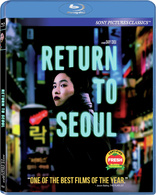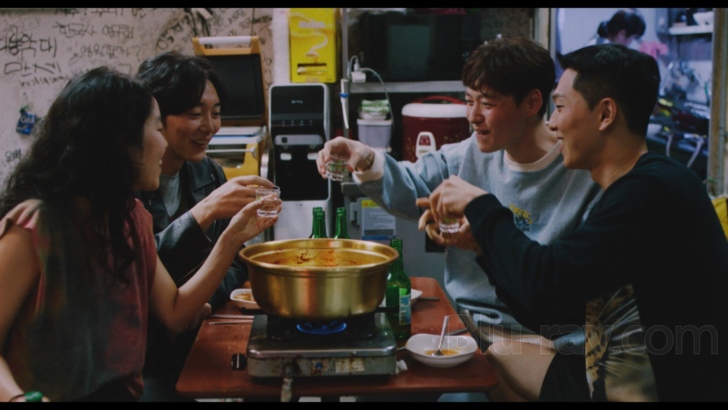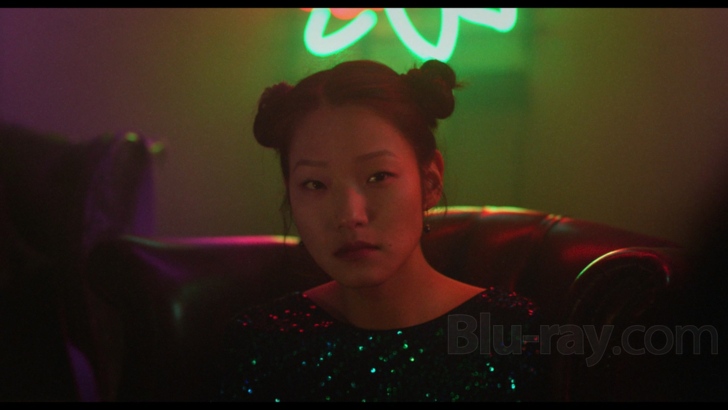Return to Seoul Blu-ray Movie
HomeReturn to Seoul Blu-ray Movie 
Retour à SéoulSony Pictures | 2022 | 115 min | Rated R | Apr 25, 2023

Price
List price:Amazon: $25.99 (Save 6%)
Third party: $25.99 (Save 6%)
Only 4 left in stock (more on the way).
Movie rating
7.6 | / 10 |
Blu-ray rating
| Users | 0.0 | |
| Reviewer | 4.0 | |
| Overall | 4.0 |
Overview
Return to Seoul (2022)
A twenty-five-year-old French woman returns to Korea, the country she was born in before being adopted by a French couple, for the very first time. She decides to track down her biological parents, but her journey takes a surprising turn.
Starring: Park Ji-min, Oh Gwang-Rok, Guka Han, Kim Sun-young, Yoann ZimmerDirector: Davy Chou
| Foreign | Uncertain |
| Drama | Uncertain |
Specifications
Video
Video codec: MPEG-4 AVC
Video resolution: 1080p
Aspect ratio: 1.85:1
Original aspect ratio: 1.85:1
Audio
French: DTS-HD Master Audio 5.1 (48kHz, 24-bit)
French, Korean, & English dialogue; 3199 kbps
Subtitles
English, English SDH, French, Spanish
Discs
Blu-ray Disc
Single disc (1 BD)
Playback
Region free
Review
Rating summary
| Movie | 4.5 | |
| Video | 4.5 | |
| Audio | 5.0 | |
| Extras | 0.5 | |
| Overall | 4.0 |
Return to Seoul Blu-ray Movie Review
Reviewed by Dr. Stephen Larson May 7, 2023Franco-Cambodian filmmaker Davy Chou's second fiction feature Retour à Séoul (Return to Seoul, 2022) is a smart examination of intercountry adoption across two cultures. The picture is at least somewhat autobiographical because co-writer Laure Badufle and lead actress Park Ji-min were each born in Korea and adopted by French parents. Return to Seoul is demarcated into three sections with an epilogue over an eight-year span. Frédérique “Freddie” Benoît (Park Ji-min in her screen debut) is a 25-year-old Korean-born French adoptee whose flight to Japan is rerouted to South Korea on a whim (as she puts it to a friend) due to a typhoon. Freddie is befriended by Tena (Guka Han), a hostel clerk, and Tena's friend Dongwon (Son Seung-Beom). Freddie can hardly remember anything about her Korean upbringing and only knows how to speak French. Fortunately, Tena and Dongwon are also fluent in the language. They share drinks together at the hostel. Chou presents this scene (and several others) as a study of identity and cross-cultural differences. For instance, Freddie doesn't know that it's a Korean custom to pour soju from one's own bottle into another person's glass. She rudely imbibes her own bottle with negligence.
Since Freddie doesn't know what happened to her biological parents, Tena encourages her to visit the local Hammond Adoption Center. When an employee retrieves her file, Freddie learns that her birth name is Yeon-Hee, which means “docile and joyous”. Neither trait applies to Freddie in the present but one may in the future. While it takes a long time to hear from her birth mother, Freddie hears from her real father (Oh Kwang-rok, a Park Chan-wook regular) almost immediately. Freddie's dad works as a repairman. He has an extended family with kids along with Freddie’s aunt (Kim Sun-Young) and grandmother (Hur Ouk-Sook). The father is saddened that he had to give Freddie up years ago and wants her to move permanently to Korea. Freddie is obdurate that she's remaining in France. The always-kind Tena translates Freddie's exchanges with her father.

The movie flash-forwards two years later when Freddie is visibly older. She dons a black leather jacket and has dark lipstick. She works as a consultant for a French arms dealer André (Louise-Do de Lencquesaing) who's older than her. Freddie becomes part of the underground punk culture. She frequents the strobe-lighted disco clubs where she immerses herself in dance to escape from her problems. She later hooks up with a tattooist, who becomes her boyfriend. In the movie's last section, Freddie now has a French boyfriend, the genteel Maxime (Yoann Zimmer). Through the years, Freddie's father texts and emails her while in an inebriated state. He's lonesome and wants his daughter close to him. Freddie is resistant much of the time.
Park Ji-min is absolutely remarkable in her first big-screen film, portraying Freddie as a chameleon. She's a multifaceted character who's selfish, impulsive, and continually evolving as a young adult. The movie's atmosphere and some of the themes remind me of Taiwanese auteur Hou Hsiao-hsien's excellent Millennium Mambo (2001), which will soon be released on Blu-ray in the US from a 4K restoration. Freddie is similar to Vicky (Shu Qi) from Hou's film in that they're both trying to find themselves as their identities are in flux. Alienation and the feeling of being isolated in one's "private zone" is also a common thread between the two pictures. Techno music and pop songs figure very prominently in each. Indeed, DJ Finorski's "The techno wave is back" is heard in Millennium Mambo. Both of these Asian films are must sees.
Return to Seoul Blu-ray Movie, Video Quality 

Sony Pictures Classics' new release of Return to Seoul comes on an MPEG-4 AVC-encoded BD-50 (disc size: 30.55 GB). The film appears in its original exhibition ratio of 1.85:1. Cinematographer Thomas Favel shot the picture with an Arri Alexa Mini and Panavision Primo Standard series, which he rented from Panavision Wallonie. The recording codecs and recording resolutions were ARRIRAW in 3.4K and ProRes 4444 in 3.2K. Based on my research, I have a strong hunch that the DI was completed in 2K. I also infer that its DCP was presumably projected in the same resolution at festivals. The image has no source or technical flaws on the disc. Sony has encoded the feature, which takes up 28.10 GB of the disc, at a standard video bitrate averaging 26462 kbps. Since this Blu-ray is basically a bare bones, I would have liked to have seen a maxed-out bitrate.
Favel gave an interview about the film's various color schemes at the beginning of this year with Brigitte Barbier of AFC (French Society of Cinematographers). It was translated from French by Alexander B. Raiffe. Favel says he chose pink tints to come out in the bright lights. You can see the tints cast on Freddie's face in Screenshot #22. Favel credits colorist Yannig Willmann's for introducing several effects that emphasize the strobe lighting in the dance scenes. For the long scene in the home of Freddie's Korean dad, Favel explained: "In the father's house, for example, there was an LED panel on the ceiling that created a square of bright light. Bertrand Prévot, my gaffer, and I, used this to reinforce the idea that Freddie wasn't at home in that house." The LED panel is accentuated nicely on this transfer. For the soft focus shots on the actors' faces, Favel told Barbier that he utilized a Mitchell "D" filter to create varying levels of blur. The movie's color palette has a mixture of purple, red, mint green, and neon.
Seventeen chapters accompany the 119-minute feature.
Return to Seoul Blu-ray Movie, Audio Quality 

Sony has supplied a DTS-HD Master Audio 5.1 Surround mix (3199 kbps, 24-bit) as the disc's sole sound track. Dialogue is mostly spoken in French and Korean along with some English. This is a practically flawless presentation. Delivery is clear and crisp. The original music is by Jérémie Arcache and Christophe Musset. The composers came up with a drum-heavy theme for Freddie and a keyboard piece for her birth name "Yeon-Hee". They wrote the terrific ballad "Anybody", which Freddie selects on the jukebox and dances to. Schwefelgelb, which is made up of the Berlin duo Jonas Förster and Philipp Graf, has their techno song "Durch Die Haare Die Stirn" (Remastered Version) played non-diegetically in a club scene. The quality of the performance is outstanding with excellent bass. It reminds me of Atomic Babies' "Cetch Da' Monkey", which has a memorable rendition featured in Larry Clark's Bully (2001). One of the other ballads played in the club boasts great treble. Other songs include Shin Joong Hyun's "Beautiful Rivers and Mountains" and Lee Jung Hyun's "Petals".
The disc contains subtitling options in English, English SDH, French, and Spanish. Both English tracks also display the English dialogue on the screen. The neat thing about the SDH is they display which musical piece is being performed (see Screenshot #s 22-24).
Return to Seoul Blu-ray Movie, Special Features and Extras 

- Theatrical Trailer (2:04, 1080p) - Sony's post-festival trailer for Return to Seoul presented in 1.85:1 anamorphic widescreen and subtitled in English. It carries an average video bitrate of 26478 kbps and comes with a Dolby Digital 5.1 Surround track (448 kbps). WARNING: Don't watch this trailer if you've never seen the film as it drops a major spoiler!
- Bonus Previews - additional trailers for other Sony Pictures Classics titles: Parallel Mothers, One Fine Morning, The Son, Compartment No. 6, and Living.
Return to Seoul Blu-ray Movie, Overall Score and Recommendation 

Return to Seoul proceeds in an unpredictable fashion over a eight-year period in three Korean cities. Park Ji-min delivers a well-rounded performance that always feels authentic to the capricious character she portrays. I hope that director Davy Chou's maiden fiction feature Diamond Island (2016) receives an English-friendly physical media release. Sony's 2K transfer is beautiful and its DTS-HD MA 5.1 presentation is pretty phenomenal. I would have loved at least a few extras. Still, this disc comes HIGHLY RECOMMENDED.
Similar titles
Similar titles you might also like

Le beau Serge
1958

Stray Dogs
郊游 / Jiao you
2013

The Fire Within
Le feu follet
1963

Goodbye to Language 3D
Adieu au langage
2014

Young & Beautiful
Jeune et jolie / Slipcover in Original Pressing
2013

Diary of a Country Priest
Journal d'un curé de campagne
1951

Things to Come
L'avenir
2016

Girlhood
Bande de filles
2014

Drive My Car
ドライブ・マイ・カー / Doraibu mai kâ
2021

The Big Picture
L'Homme qui voulait vivre sa vie
2010

Fantomas: 5-Film Collection
Fantômas in the Shadow of the Guillotine / Juve vs. Fantômas / The Murderous Corpse / Fantômas vs. Fantômas / The False Magistrate
1913

The Measure of a Man
La Loi du Marché
2015

The Phantom Carriage
Körkarlen
1921

An Elephant Sitting Still
大象席地而坐 / Da xiang xi di er zuo
2018

Touki Bouki
1973

Tout Va Bien
1972

Alice in the Cities
Alice in den Städten
1974

Master of the House
Du skal ære din hustru
1925

Like Someone in Love
ライク・サムワン・イン・ラブ / Raiku samuwan in rabu
2012

Wild Strawberries
Smultronstället
1957